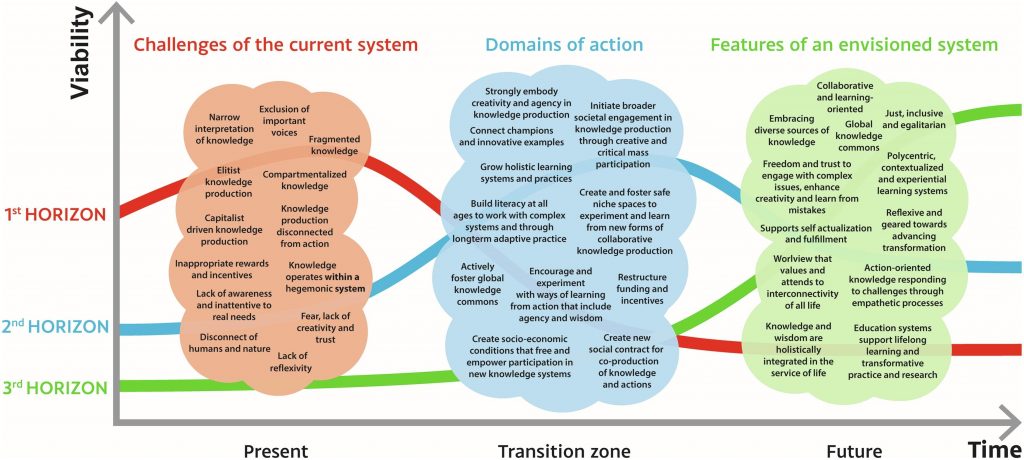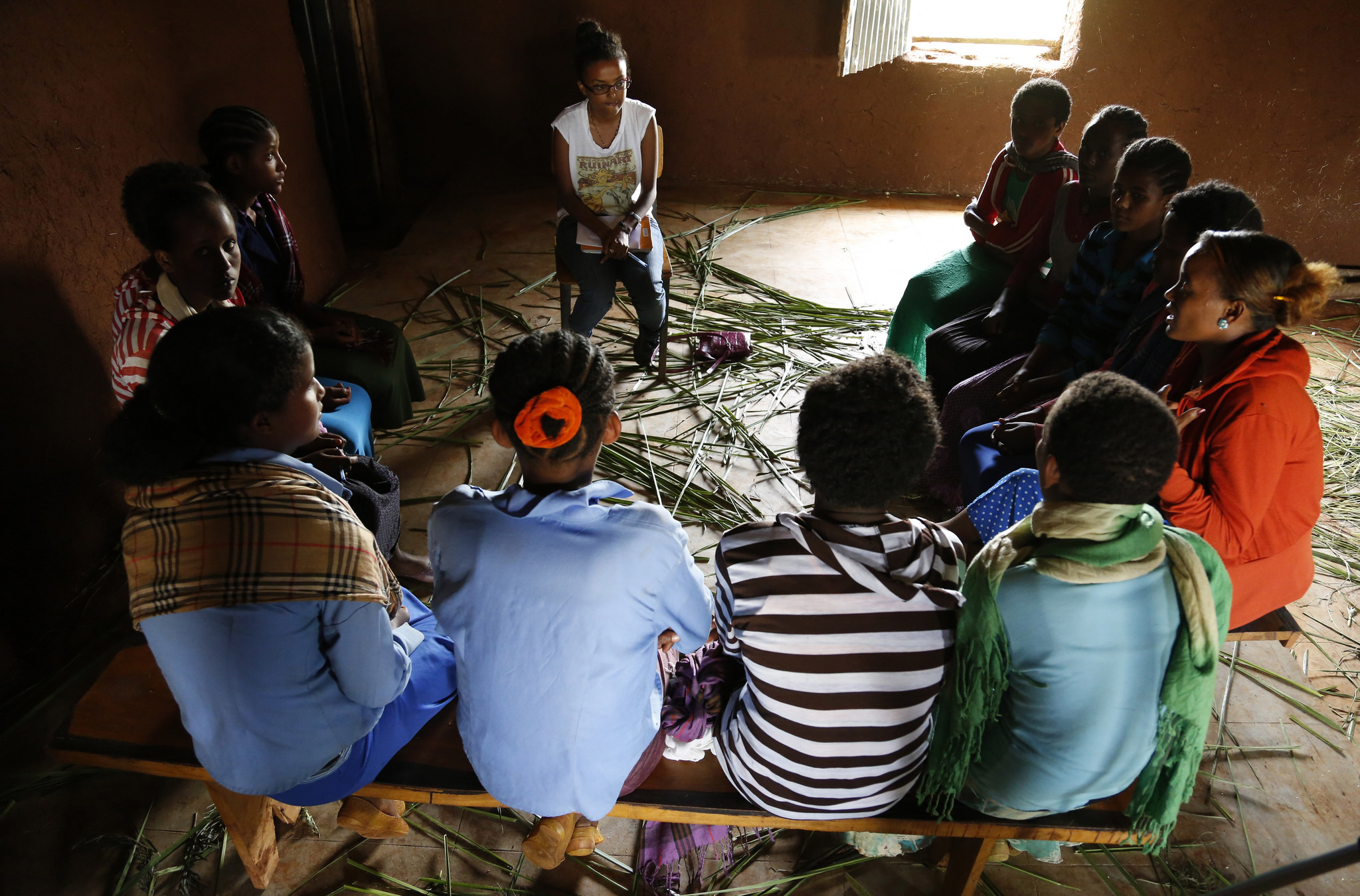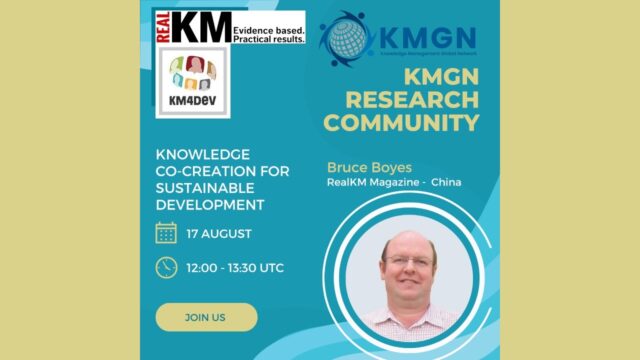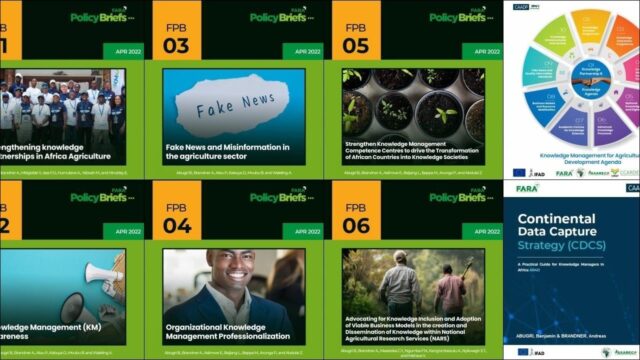
Visions of knowledge systems for life on Earth and how to get there
By Niko Schäpke and Ioan Fazey. Originally published on the Integration and Implementation Insights blog.
How should formalized knowledge systems, including universities, research institutes and education, transform to keep pace with wider and inevitable societal transformations associated with accelerating global change? What kinds of changes are needed in these knowledge systems and how can they be encouraged?
These questions were explored by participants of the Transformations 2017 conference and in subsequent research1. This included highlighting current challenges, envisioning future systems and the policy and actions required for the transition. These are summarized in the figure below.
Challenges of current knowledge systems
Current systems are limited by frequently being disconnected from action, being elitist, fragmented and compartmentalized. Narrow interpretations of what counts as knowledge prevail, excluding integration with ethics and aesthetics. Knowledge production is also based on a worldview of a disconnect between humans and nature. There is limited questioning of how knowledge creation is influenced by, and reproduces, the unsustainable societies in which knowledge creators are embedded.
What we envision for future knowledge systems
To be a genuinely creative force for change, knowledge systems will need to be much more collaborative, open, diverse, egalitarian, reflexive, responsible and able to work with values and systemic issues. They need to be able to work with interconnected issues; be much more action-oriented locally and globally; be inclusive of diverse forms of knowledge; and be supported by processes promoting trust, collaboration, and high levels of creativity. Overall, future knowledge systems need to support a science for all that goes beyond producing knowledge about our world to also generating wisdom about how to act within it.
What policies and actions are required to support transformation from current to future knowledge systems?
A range of interconnected policy and action domains were identified that would help the transition to future, envisioned knowledge systems:
- Connect champions and innovative examples of transformative knowledge production to increase momentum.
- Initiate broad societal engagement in knowledge production through creative, critical mass participation involving diverse audiences to challenge accepted knowledge.
- Embody creativity and agency in knowledge production to inform action for transformation and support learners to become agents of change.
- Actively foster and democratize a global knowledge commons to integrate diverse knowledge sources and make knowledge accessible in a transparent and equitable way.
- Create and nurture safe spaces to experiment, learn from and develop capacities for new forms of collaborative knowledge production, supported by boundary spanning organizations and collaborative partnerships.
- Restructure funding and incentives in line with community priorities such as the Sustainable Development Goals (SDGs), and support transdisciplinary and action-oriented types of research consistent with these needs.
- Create a new social contract for co-production of knowledge in which agendas, decisions and actions are informed by democratic collaboration between citizens, trans-disciplinary scientific networks and policy makers.
- Develop free, intercultural and holistic education systems and practices for life-long learning which promote, for example: critical reflexivity; diverse knowledge perspectives; mind-body-emotion, place, nature, science-art connections; and experiential learning.
- Build complex systems literacy at all ages allowing learners to gain capacities for systems thinking and understanding the implications of complex system dynamics for practice.
- Encourage ways of learning from action that include agency and wisdom, making use of iterative learning cycles combining action and reflection.
- Create socio-economic conditions to empower participation of billions of currently excluded people in knowledge systems. Global reforms are required to abolish exploitative structures and provide fair access to income, employment and education.

Conclusions
Current knowledge systems are not well aligned to the new world in which we find ourselves and are not sufficiently oriented towards working with issues like climate change which pose existential threats to people and many other species on our planet. The level of change needed in knowledge systems to effectively support wider societal transformations should not be underestimated. To overcome deeply entrenched assumptions and patterns, this change probably needs to be at the scales seen during the Age of Enlightenment (1715-1789) and the scientific and technological revolution accompanying the Second World War (1939-1945).
While this may be daunting, much is already known about what needs to be achieved and how it could be encouraged. At this critical climate juncture and sixth planetary species extinction, we urgently need to shift towards the generation of wisdom to ensure longevity of human life and other species on our planet.
What do you think? Are there key challenges we have missed? Would you add additional elements to future knowledge systems? Are there other policy and action steps to be taken to speed up the transformation?
Biographies
 |
Niko Schäpke PhD is an assistant professor at the University of Freiburg, Germany. He is an interdisciplinary social scientist interested in the governance of sustainability transformations. His research focus is on settings and methods of transdisciplinary and action-oriented sustainability science as well as dynamics of human agency and spaces for societal learning and change. He is passionate about advancing the capacity of sustainability sciences to contribute to transformations. |
 |
Ioan Fazey PhD is Professor of the Social Dimensions of Environment at the University of York, UK. His research and teaching focuses on resilience, transformations and sustainability. He actively supports and facilitates a growing field of research and action associated with understanding how to achieve significant change in relation to social and environmental sustainability. |
See also:
- Video and blog posts – Transforming Knowledge Systems for Life on Earth
- Is it time for transformations towards “Common Good KM”?
- What are the potential knowledge management (KM) disciplines in an interdisciplinary approach to KM?
Article source: Visions of knowledge systems for life on Earth and how to get there, republished by permission.
Header image source: Arek Socha on Pixabay, Public Domain.
Reference:
- Fazey, I., Schäpke, N., Caniglia, G., Hodgson, A., Kendrick, I., Lyon, C., … & Saha, P. (2020). Transforming knowledge systems for life on Earth: Visions of future systems and how to get there. Energy research & social science, 70, 101724. ↩






